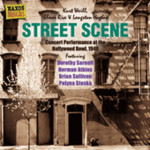
Weill: Street Scene (Hollywood Bowl Performance recorded in 1949)
 $25.00
Low Stock
add to cart
$25.00
Low Stock
add to cart
KURT WEILL
Weill: Street Scene (Hollywood Bowl Performance recorded in 1949)
Dorothy Sarnoff / Norman Atkins / Brian Sullivan / Polyana Stoska / Izler Solomon
[ Naxos Nostalgia Musicals / CD ]
Release Date: Saturday 1 August 2009
Should this item be out of stock at the time of your order, we would expect to be able to supply it to you within 2 - 5 business days.
There are many things to cheer about Kurt Weill and the varied career he led in the American musical theatre, but the sheer unpredictability of it all is what proves most electrifying.
And nothing was more surprising than the creative leap he took that found him writing 1947's Street Scene.
A man who started out in Germany with Bertolt Brecht, penning works such as The Threepenny Opera, began his Stateside career with a harshly political piece such as Johnny Johnson, reminiscent of his European shows.
But then came Knickerbocker Holiday, which kept the politics, but lightened the mood, to be followed by the elegant frippery of Lady in the Dark, the gossamer sophistication of One Touch of Venus and the frankly outdated operetta of The Firebrand of Florence.
It was after the failure of the last work, in fact, that Weill was reminded of how moved he had been by seeing a Berlin production of Street Scene, Elmer Rice's 1929 Pulitzer Prize winning drama of life in the slums on the East Side of Manhattan.
In fact, he had approached the testy and egomaniacal Rice years before with his request, only to be told that "Whatever prestige value there would be in a successful musical version would accrue primarily to the composer."
Still, Weill continued to pursue Rice, who-riding high on the success of his 1945 hit, Dream Girl-finally decided to agree to the composer's proposal.
As lyricist, Weill brought on black poet Langston Hughes, who had no credits as a Broadway lyricist up to that point. He collaborated beautifully with Weill and some of their combined works written for the show such as Lonely House, What Good Would the Moon Be? and Somehow I Never Could Believe have a unique beauty.
Producer's Note
This version of Street Scene was part of a two-hour concert broadcast live from the Hollywood Bowl and recorded by the Armed Forces Radio Service, who pressed it on sixteen-inch transcription discs. Program host Jack Little, not heard here, described the proceedings and introduced the performers but said nothing about the plot or characters, and in fact we've had to make educated guesses concerning a couple of numbers he did not announce. He also apologized to the radio audience after the opening number because one microphone failed to work, leaving the vocal ensemble almost inaudible.
